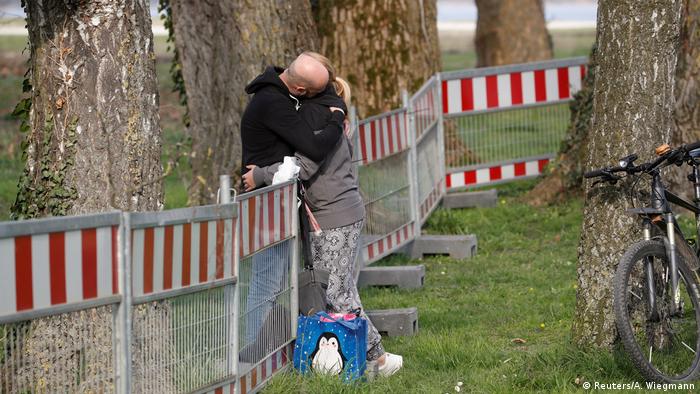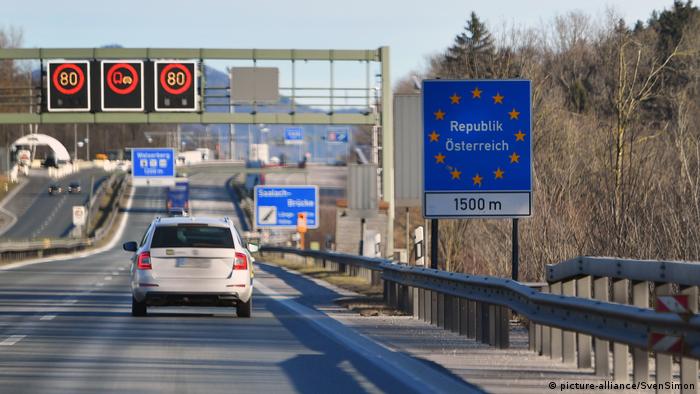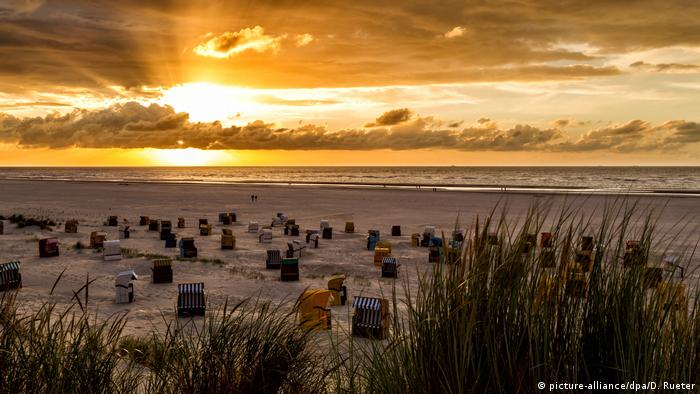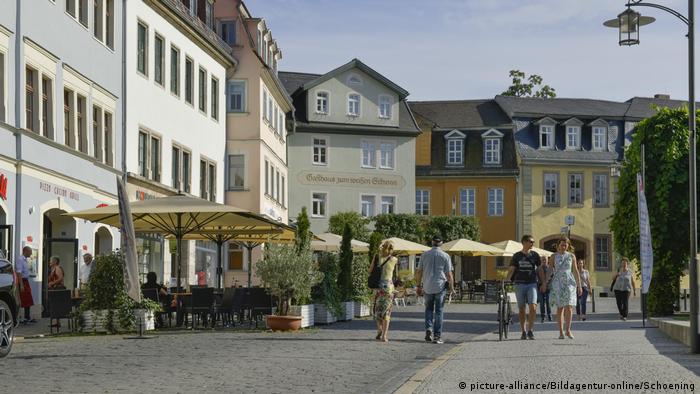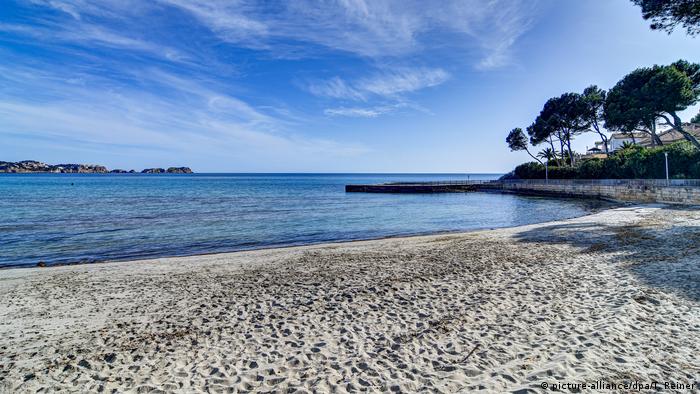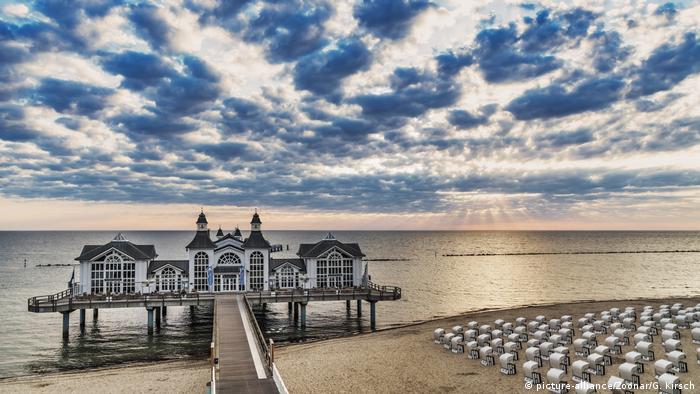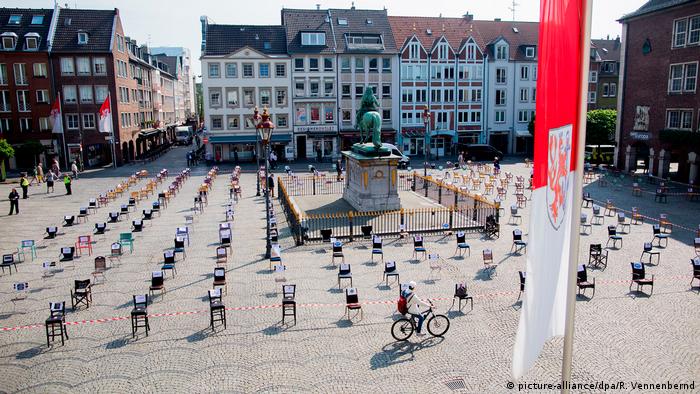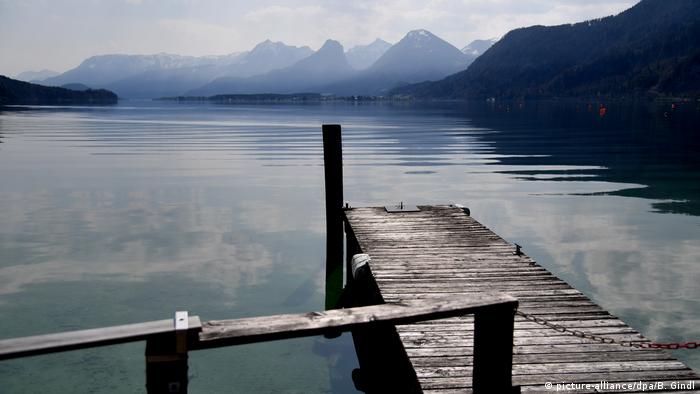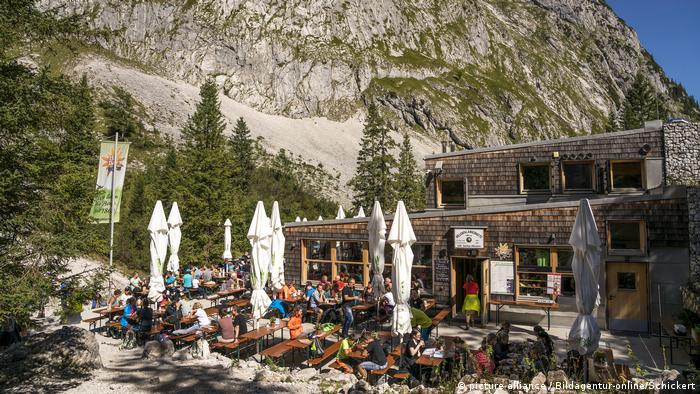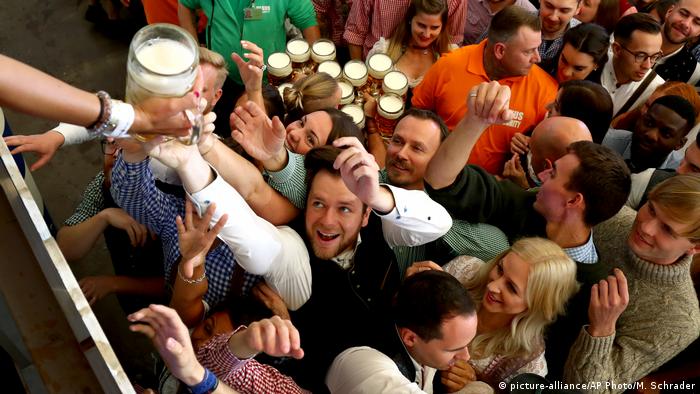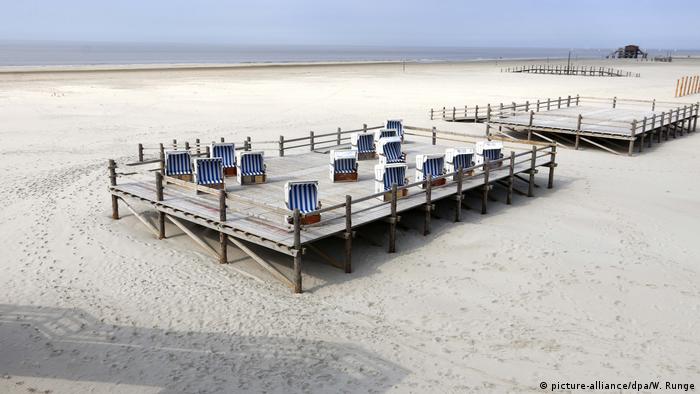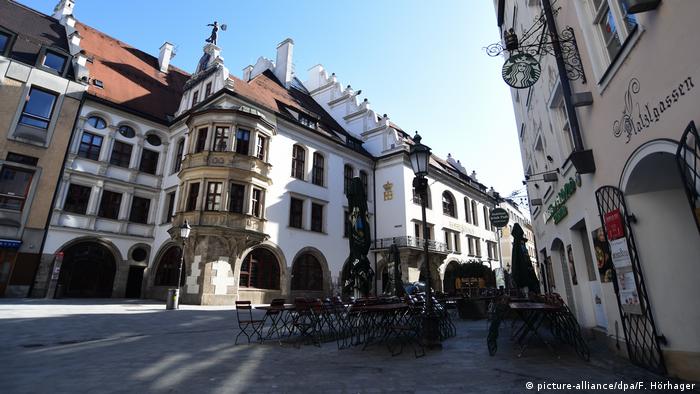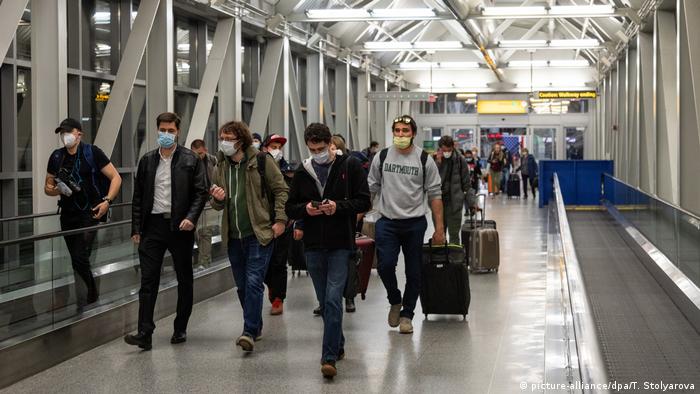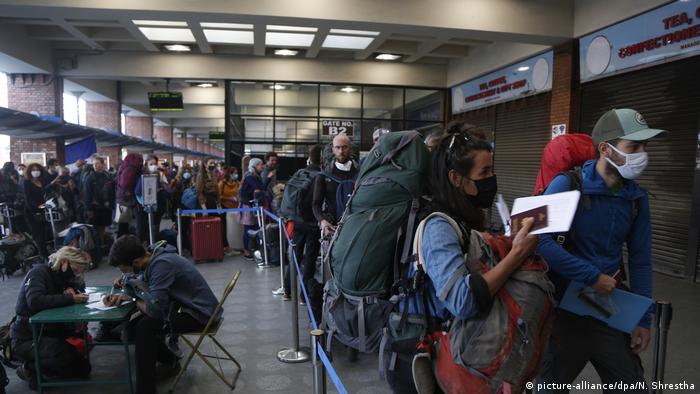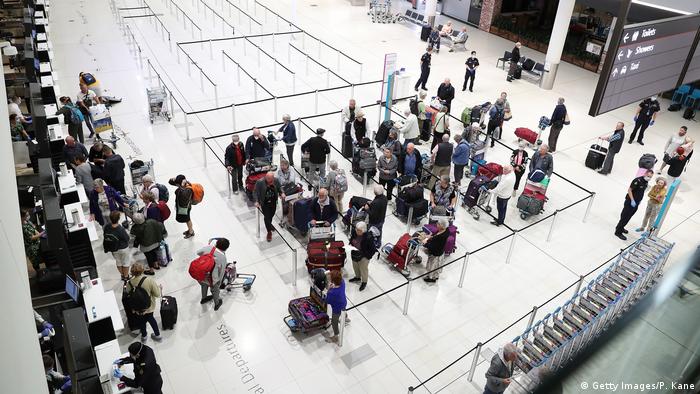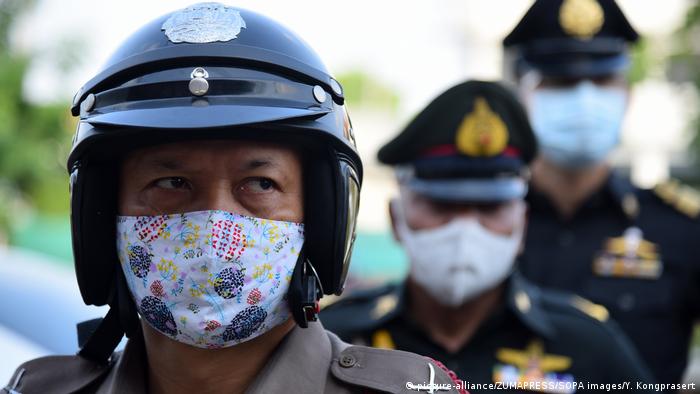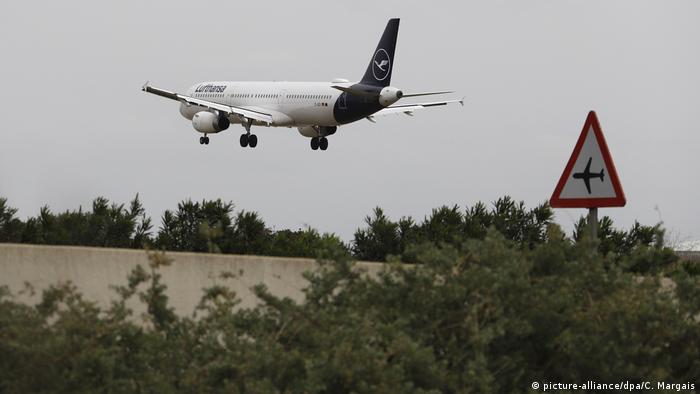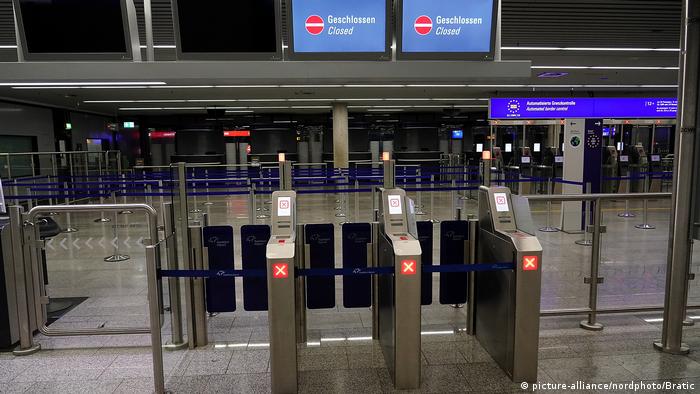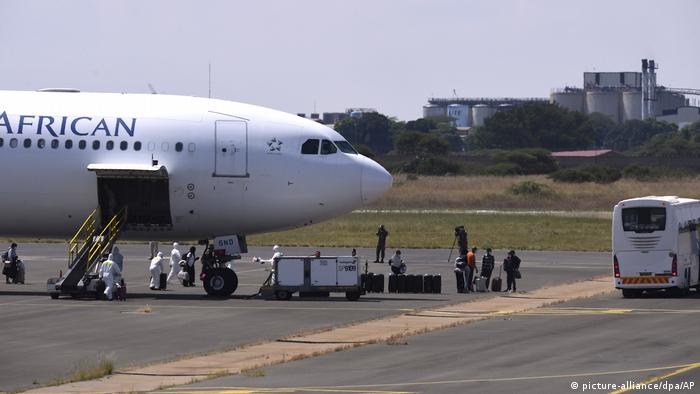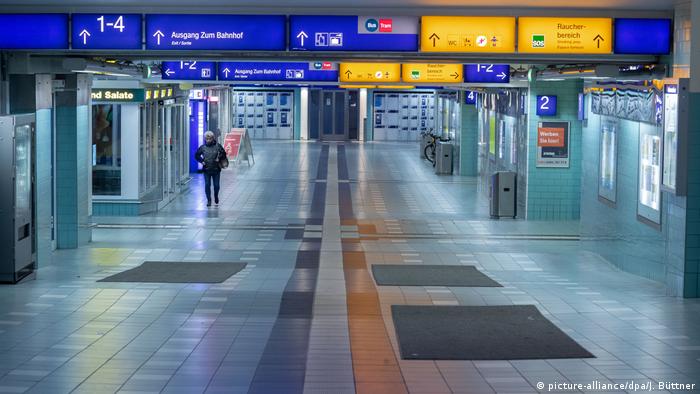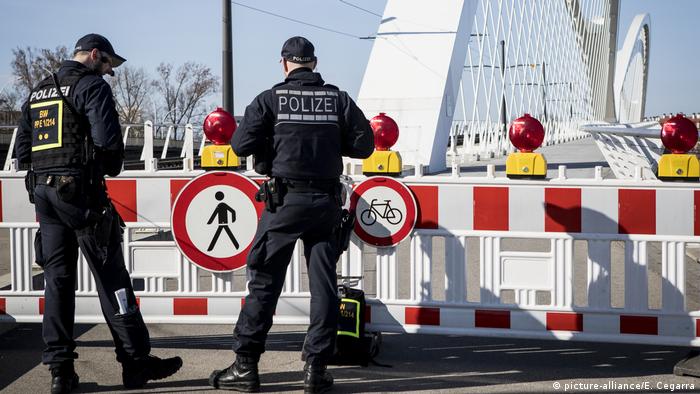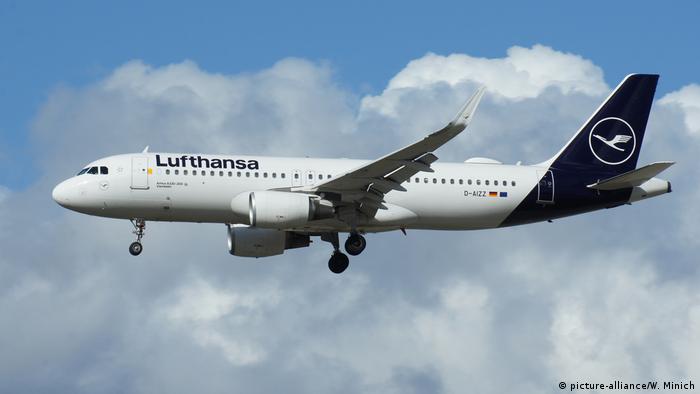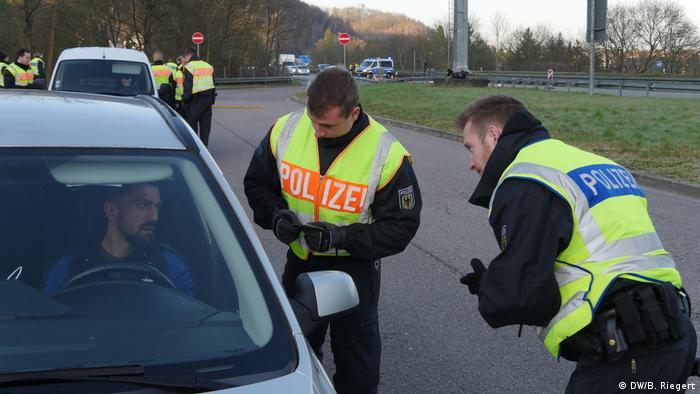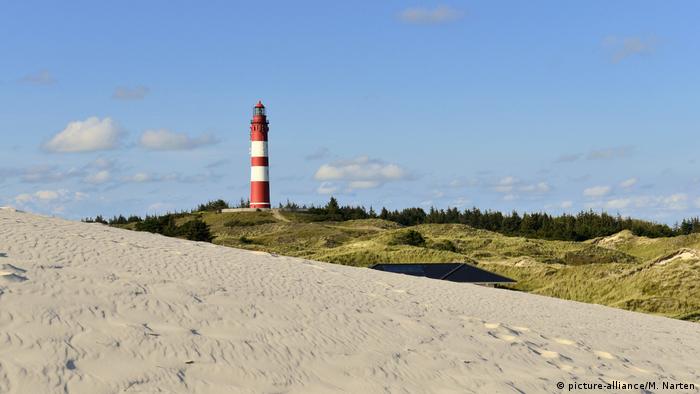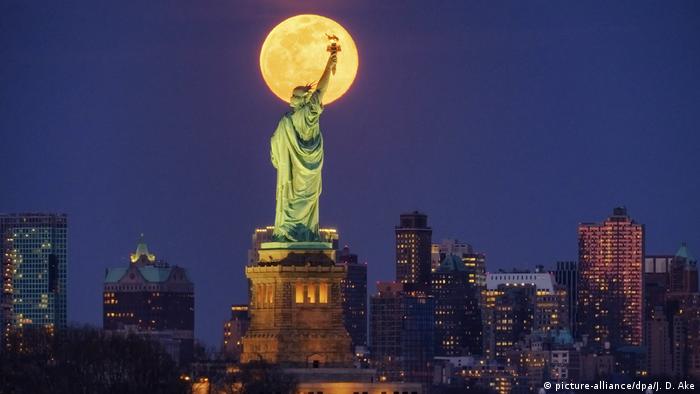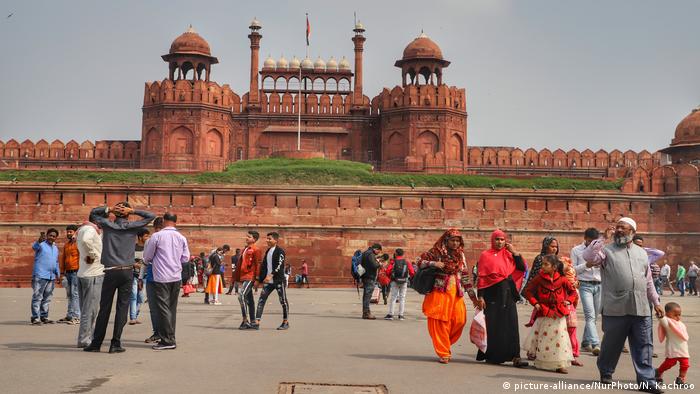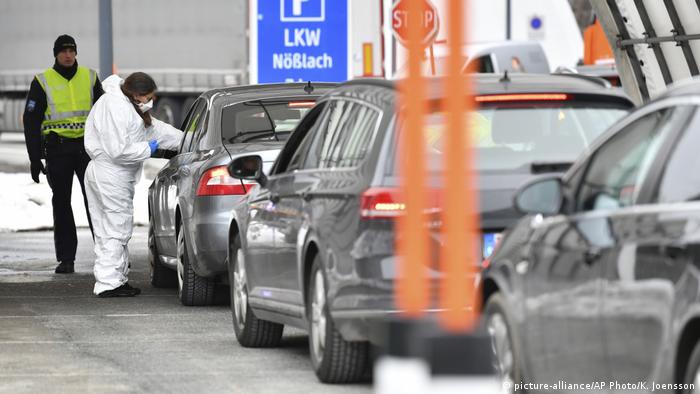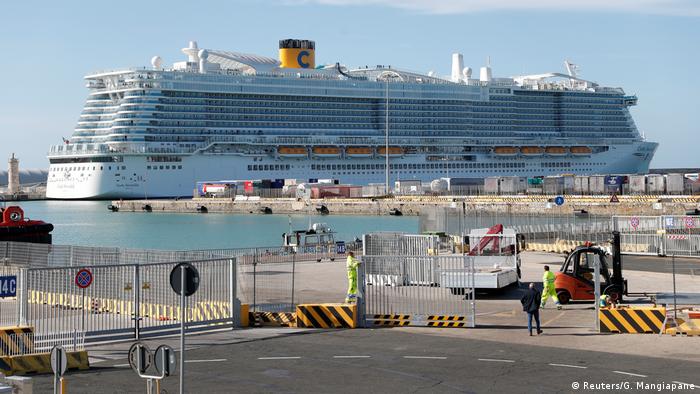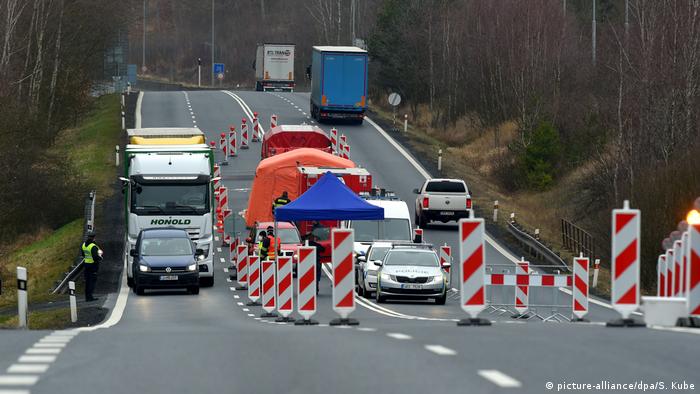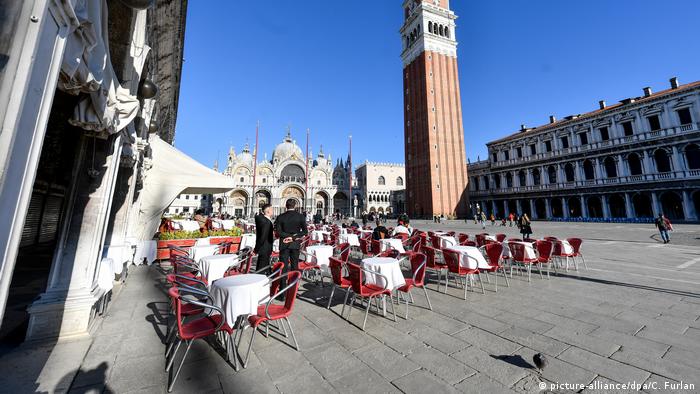Coronavirus: Pandemic slowing in Europe, WHO says
The head of the World Health Organization's Europe office has said the spread of the coronavirus across Europe is slowing, but he added there was "no room for complacency." Follow DW for the latest.
- The WHO says easing of restrictions must be "phased and gradual" and all countries should remain on high alert
- More than 4.4 million cases have been registered worldwide, resulting in over 300,000 deaths
- Germany will begin relaxing border control measures on Saturday, while unrestricted access for several neighboring countries is expected by June 15
- The UN says the pandemic has caused mental stress around the world
Updates in Universal Coordinated Time (UTC/GMT)
21:50 Germany's international language and culture institute, the Goethe-Institut, along with German international schools, will receive €70 million in emergency government aid to help them survive the coronavirus crisis. The Goethe-Institut, which has 157 locations in 97 countries, has been hit hard financially during the crisis, as most of its language courses were canceled. Germany's 140 international schools were also affected by the global crisis as many parents have been unable to pay fees.
"International cultural policy is indispensable for a foreign policy focused on societies that should be able to continue interacting and networking despite the coronavirus crisis," said German Foreign Minister Heiko Maas.
21:05 Here is the latest on what’s been happening in Europe:
In Germany, the critical R number has dropped slightly to 0.75 from 0.81, according to disease control agency the Robert Koch Institute. The number indicates the reproduction rate of coronavirus, with a rate of 1 showing that each infected person passed on the virus to an average of one other person. The figure caused alarms at the weekend when it rose over 1 just as Germany was reopening many parts of public life, but this increase has been linked to several anomalous hotspots across the country.
Denmark has refused to give a date for reopening its borders, despite increased pressure from the tourism industry. Prime Minister Mette Frederiksen said she will give an update on June 1 about when the borders with Germany, Sweden and Norway will reopen. Pressure has been mounting this week after German Interior Minister Horst Seehofer said he would like border restrictions to be relaxed as soon as possible.
While the UK and Germany are set to place massive orders of antibody testing kits from the Swiss diagnostics company Roche, Switzerland itself has not yet put its faith in the technology. "The government up to now has not bought any tests," a Swiss Health Ministry spokesman told Reuters news agency. "Their ability to inform us remains simply too uncertain for them to be part of an easing strategy."
Eight anti-lockdown protesters were arrested in Bulgaria as over 2,000 took the streets to protest government restrictions on public life. The rally was organized by a radical left-wing party in Sofia, some of whose members have described coronavirus as "fake news" and an "international conspiracy." Residents of the country are living under the effects of the "health emergency situation."
Spain and Italy, two of Europe’s worst-hit countries, have reported rises in daily deaths, as both countries begin to ease lockdown restrictions. Deaths in Italy rose by 262 compared to 195 on Wednesday, while in Spain cases rose by 217, up from 184 the day before. Officials in both countries are concerned about a second wave hitting the countries, after trends over the last week saw decreasing death counts.
French health authorities on Thursday announced 351 new COVID-19 deaths, putting the total at 27,425. This, once again, places it above Spain for the world's fourth highest death toll. France first passed Spain's number of deaths on Tuesday, but dipped below it on Wednesday.
Overall, the number of cases and deaths in France is on a downward trajectory following a 55-day lockdown that was lifted Sunday. The number of new cases on Thursday increased by 622 to a total of over 141,000. During the height of the epidemic on March 31, France recorded over 7,500 new infections in 24 hours.
Slovakia has become one of the first European countries to approve a tracking app designed to alert authorities if people break self-quarantine rules. Slovaks returning home from abroad will not have to go to government quarantine facilities if they can download the app. Breaking quarantine will be punished by fines of up to €1,650 ($1,800).
20:08 The US will have a "very difficult" time reinstating lockdown measures once it begins lifting coronavirus restrictions, said Dr. William Schaffner, professor of preventive medicine at Vanderbilt University, in an interview with DW.
"I'm rather skeptical that once we start to open up here in the US that there will be a reversion to lockdown," Schaffner said in Nashville, Tennessee. "There will be a great deal of resistance to going back to sheltering at home to the severe extent that we have done in the past.''
Despite having nearly a third of global coronavirus cases, the US has seen protests across the country against lockdown measures designed to prevent the spread of the disease. President Donald Trump has also criticized Democratic governors who have made "stay at home" orders in their states.
According to data from Johns Hopkins University, the US has recorded the most cases of COVID-19 in the world with more than 1.4 million and the most coronavirus-related deaths with more than 85,000.
19:37 US President Donald Trump has toured a mask distribution center in Pennsylvania — without wearing a mask himself. In an effort to highlight his administration’s effort to fight coronavirus, Trump aimed to highlight the US mask production.
Images showed the president surrounded by advisers and employees wearing masks, while he did not. Trump has resisted wearing a mask in public, while his administration recommends it.
Several US states have continued to reopen as infection rates continue to rise. Many experts recommend wearing masks in public, but US states have shied away from making this law.

Thursday was not the first time the US president has been seen without a face mask while others around him wear them
18:35 Global deaths from coronavirus have passed 300,000, with over 4.4 million confirmed infections, according to Johns Hopkins University.
Here are the 10 countries that have suffered the most deaths:
- United States — 84,985
- United Kingdom — 33,692
- Italy — 31,368
- Spain — 27,321
- France — 27,077
- Brazil — 13,555
- Belgium — 8,903
- Germany — 7,868
- Iran — 6,854
- The Netherlands — 5,609
Here are the 10 countries with the most confirmed cases:
- United States — 1.45 million
- Russia — 252,245
- United Kingdom — 234,431
- Spain — 229,540
- Italy — 223,096
- Brazil — 196,375
- France — 178,184
- Germany — 174,284
- Turkey — 144,749
- Iran — 114,533
18:00 Coronavirus infections have been confirmed in one of the refugee camps in southern Bangladesh that house more than 1 million Rohingya refugees, officials have confirmed.
An ethnic Rohingya refugee and one other person tested positive, according to a UN spokeswoman. An outbreak is greatly feared in the refugee camps, given the cramped conditions and poor hygiene in the camps.
"Today they have been taken into isolation after testing positive," Mahbub Alam Talukder of the Bangladeshi Refugee Relief and Repatriation Commissioner told Reuters news agency.
The rate of infections in Bangladesh has been gathering pace in recent days in Bangladesh. There have been 18,863 confirmed cases and 283 people have died.
17:30 A few hundred demonstrators in the northern US state of Michigan gathered outside the state's legislature to protest a coronavirus stay-at-home order.
Michigan United for Liberty, a conservative activist group, was leading the protest. The group has organized several protests since April and has sued Democratic Governor Gretchen Whitmer over the state's coronavirus restrictions.
Several Midwestern states have seen protests outside of government buildings and governor's mansions against stay-at-home measures to combat the spread of the coronavirus. Other Democratic governors have faced lawsuits and legislation aimed at curtailing lockdown orders.
On Wednesday, Wisconsin's conservative State Supreme Court tossed out a "safer at home" order from Democratic Governor Tony Evers. It ruled that the governor would have to work with the state's Republican-controlled Legislature to enact a lockdown plan, a process that could take weeks.
The ruling drew praise from US President Donald Trump, who said it was a "win" for the state.
17:05 UK officials have confirmed that an antibody test will be rolled out across the country "in days and weeks." Transport Secretary Grant Shapps said the new antibody test was "very exciting" and a "very, very reliable antibody test." He said it will be "rapidly rolled out," first to hospitals and care workers.
The antibody test, which has already been approved in the EU and the US, aims to show whether someone has had COVID-19, even if they have already recovered or show no symptoms.
The UK hit its highest daily testing figure on Thursday, managing to test 126,064 people for COVID-19. In April, Health Secretary Matt Hancock pledged that every day over 100,000 people will be tested — a target that has been met only a handful of times.
Shapps also urged people not to use public transport in the UK's daily press briefing, calling it "our civic duty" to avoid it. The government came under fire this week when it encouraged some people to go back to work but avoid public transport.
16:13 Clinics in Moscow, the epicenter of Russia’s coronavirus outbreak, will begin randomly testing residents for coronavirus on Friday, the mayor has announced.
The testing will be free and voluntary and will aim to "show the real picture" of where Russia stands with the epidemic, Mayor Sergei Sobyanin said on state television.
"Every three days, we will send out 70,000 invitations to Moscow residents to have their blood drawn at clinics," he said. Residents will be invited by text message or e-mail.
The testing also aims to see how many Moscow residents may be immune to the disease. Over 130,000 people have tested positive in Moscow, as numbers continue to sky-rocket in Russia. The country now has the second-most cases in the world after the United States, with 252,245.
16:10 Mothers working outside the home ended up reducing their paid employment to care for children twice as much as fathers as the coronavirus crisis reasserts traditional behaviors, according to a report by Germany's Institute of Economic and Social Research (WSI).
The institute's April survey of 7,677 wage earners found that 27% of waged moms had reduced paid hours done for employers while only 16% of fathers had done so, said WSI researchers Bettina Kohlrausch and Aline Zucco.
Faced by school and nursery closures in mid-March as Germany shut down much of public life to slow the spread of the coronavirus, child care for under-14s had fallen more on moms who already on average earned less, said the WSI.
"54% of the women surveyed but only 12% of the men stated that they are responsible for the majority of childcare," noted the authors.
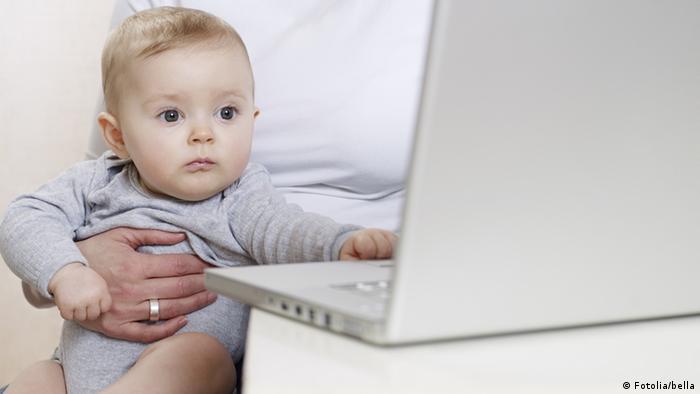
Mothers stay home twice as much as fathers to care for children as schools and nursery close
16:00 Italy will start testing a representative sample of 150,000 people in 2,000 cities next week in an effort to better understand the extent of the pandemic, the government’s scientific committee told parliament.
Italy was the first European country to impose a nationwide lockdown in March after initially being one of the worst-hit countries in the world. Over 22,000 cases have been confirmed and at least 31,000 people have died.
"The testing program will involve a significant sample of citizens and will allow us to understand the extent of the national spread of the virus," Agostino Miozzo of the committee said.
A US company will provide the kits, which Italy hopes to use to gain an understanding of how widespread coronavirus is in the population at large.
"We are moving towards relative normality, but we remain highly concerned," Miozzo said.
15:30 A whistleblower has said the US could face the "darkest winter" of recent times if it does not improve its response to the pandemic.
Dr. Rick Bright said he was removed from his government post for raising concerns about US preparation for the outbreak. Bright was dismissed in April from his role as director of the Biomedical Advanced Research and Development Agency (BARDA), which is responsible for developing drugs to fight coronavirus.
Bright gave testimony to a US House of Representatives panel on the topic of the country's readiness to fight the virus.
"What we do must be done carefully," Bright said. "If we fail to improve our response now, based on science, I fear the pandemic will get worse and be prolonged."
US President Donald Trump described Bright as a "disgruntled employee" on Twitter a few hours earlier, and appeared to blame Bright's "attitude" for his dismissal.
15:15 New York City Mayor Bill de Blasio has confirmed that over half of the children in the city who have been diagnosed with a mystery pediatric multi-system inflammatory syndrome (PMIS) also tested positive for the coronavirus. Doctors and researchers see this as evidence that the syndrome, described by de Blasio as "parent’s worst nightmare," is linked to COVID-19.
At least 100 children have been diagnosed with PMIS, which manifests itself through high fever, vomiting and a severe rash. De Blasio reported that 55 were now confirmed to have COVID-19 or to have antibodies, which indicate they previously had the virus.
The syndrome, which has first been linked to coronavirus in recent days, has caused alarm. In general, children have proved to be relatively safe from coronavirus.
"We have lost one child, and that is painful and awful," de Blasio said. "We don’t want that to happen again."
New York City has been the epicenter of the US coronavirus outbreak, and over 27,000 people have died in the state of New York.
14:53 Azerbaijani authorities are using the COVID-19 pandemic as an excuse to persecute dissidents, the Council of Europe has said.
More than 15 opposition activists and journalists have been detained on charges including breaking lockdown rules, according to Council of Europe monitors.
"Unfortunately, these arrests follow a long-standing pattern of repressions against critics of the government," monitors Roger Gale and Steffan Schennach told the Council of Europe's parliament.
Ali Kerilimi, leader of an opposition party, has also been placed under house arrest and had his telephone wires and internet connection blocked, Gale and Schennach said.
A human rights organization, the Council of Europe is distinct from the European Union and has 47 member states, including Azerbaijan.
14:20 Some 2,000 supporters of a nationalist, pro-Russia party have staged a march in Bulgaria, accusing the government of imposing confusing restrictions to combat coronavirus, Reuters news agency reported.
Protesters waved party flags and yelled slogans aimed at Prime Minister Boyko Borissov, who has extended regulations until June 14.
The protest was largely peaceful, though some people were detained for trying to break into Sofia's parliament building. This marks the first protest in the country since a state of emergency was announced in March.
"We do not think we should be slaves," one protester said, referring to the ongoing lockdown.
The EU member state has had 2,100 confirmed cases of coronavirus and 99 people have died.
13:50 Burundi's Foreign Ministry expelled WHO experts, accusing them of "unacceptable interference in [Burundi's] management of the coronavirus," the AFP news agency reported, citing an anonymous government source.
Burundi is preparing for presidential and parliamentary elections next week. The public health experts had criticized the government's decision to dismiss social distancing recommendations aimed at preventing the spread of "coronavirus during the electoral campaign."
The UN Commission of Inquiry on Burundi said it "deeply regretted the recent decision by the government to declare persona non grata the country representative of WHO and three of its experts."
Burundian human rights activist Pacifique Nininahazwe told DW that there had been tensions between the government and WHO due to "the opaque management of the coronavirus crisis in Burundi."
"It's not that surprising," Nininahazwe said of the decision to throw out the WHO experts. "The relationships between Burundi and the international community are very, very bad since the 2015 (political crisis)."
When asked about expulsion, Burundi's Vice President Gaston Sidimwo told DW: "I don't really know anything about this decision," adding that he was currently campaigning in the country.
13:38 The United States government said there were 2.98 million claims for unemployment benefits over the last week.
Though the number is about 200,000 less than last week's tally, the number of jobless claims in the US has surpassed 36 million since economic shutdowns began in mid-March due to the coronavirus pandemic.
The report from the US Department of Labor comes a day after the head of the Federal Reserve, Jerome Powell, warned that the US risked long-term economic damage if lawmakers don't do more to prevent joblessness.
According to The New York Times, more than half of those applying for unemployment benefits in recent weeks have been unsuccessful. The American newspaper also said 13 states have yet to fully install a Pandemic Unemployment Assistance program that Congress passed in March to help workers not normally eligible for state jobless benefits.
The US has recorded nearly 1.4 million coronavirus cases since the pandemic began, accounting for nearly a third of all global cases. More than 84,000 Americans have died from the disease.
13:35 Hans Kluge, who leads theWHO's Europe office, said data has shown "an overall slowing of the pandemic" in the European region. However, he warned that authorities should "remain vigilant."
"The lesson here is: it is no time for celebration but time for preparation," said Kluge. "Even if we have had few cases, we have seen the strongest health systems can be overwhelmed in a couple of weeks."
Europe is one of the hardest-hit continents so far with several EU member states, including Italy, Spain and Germany, among the 10 countries with the highest number of confirmed coronavirus cases and deaths.
Even as restrictions are eased across Europe, several EU countries, including Germany, have warned that signs of a second wave of infections could trigger renewed lockdown measures.
13:20 Tax income collected in Germany will drop by €81.5 billion ($88 billion) in 2020 because of the effects of the coronavirus crisis, German Finance Minister Olaf Scholz has announced. This is the first time since the 2009 financial crisis that the amount of money flowing into Germany's tax coffers is expected to decrease.
This dramatic decline in tax income means Germany will have €98.6 billion less to spend this year than was predicted in November 2019, on a federal, state and local level.
Scholz said the effects of the lowered income will be felt in federal budgets until at least fall 2024.
13:10 The Spanish Health Ministry reported an increase in daily deaths, warning that the country is at-risk of suffering a second wave of infections. The death toll over a 24-hour period ending on Thursday rose to 217, up from the previous day's 184.
More than half of the cases were reported in the region of Catalonia, said the ministry's head of health emergencies, Fernando Simon.
"We are now working with the region to identify the date of the deaths and evaluate whether these are new fatalities or if there was a delay in the update," Simon said.
Spain is one of the hardest-hit EU countries with more than 228,000 confirmed cases of the novel coronavirus and 27,100 related deaths.
12:47 The French government announced a package of measures worth €18 billion ($19 billion) to ease the economic fallout of the novel coronavirus pandemic for France's tourism sector.
"Tourism is facing what is probably its worst challenge in modern history," said French Prime Minister Edouard Philippe. "Because this is one of the crown jewels of the French economy, rescuing it is a national priority."
With foreign tourism making up 8% of France's gross domestic product, France is hoping to soften the blow of the pandemic's economic fallout as European governments push forward with lifting restrictions before the summer holiday season.
However, roughly 95% of the country's hotels remain closed under nationwide restrictions on gatherings and mobility aimed at curbing the spread of the deadly pathogen.
France is one of the hardest-hit countries in the EU, with more than 178,000 confirmed cases and just over 27,000 deaths.
Read more: Which European Union countries are open for summer tourism?
11:48 Germany's Bundestag has approved a second package of measures to help fight the effects of the pandemic. The headline act grants a €1,000 cash bonus for carers of the elderly both in outpatient and inpatient capacities.
State governments and employers are encouraged to increase this sum to €1,500. It also commits an extra €50 million to the country's 375 branches of health care authorities for better equipment and more up-to-date technology.
Other measures include a heavily expanded testing regime, obligations for health insurance companies, and vaccination rules.
11:21 French pharmaceutical giant Sanofi has backtracked on comments today, after a sharp rebuke from France (see 07:00 update).
It said it would make its hopeful COVID-19 vaccine available in all countries, when it's ready, after earlier saying the US would get priority access.
"We have always been committed in these unprecedented circumstances to make our vaccine accessible to everyone," the company said in a statement. It said its cooperation with US Biomedical Advanced Research and Development Authority — which funded the development — allows it "to initiate production as early as possible.''
The European Union earlier joined France in criticizing the prioritisation of the US, saying that any vaccine must be available fairly to all countries.
"The vaccine against COVID-19 should be a global public good and its access needs to be equitable and universal," European Commission spokesman Stefan de Keersmaecker told reporters.
The EU organized the global fundraising of $8 billion (€7.4 billion) to fund vaccine research, despite the US refusing to take part.
"For us in one word it is very important that, as the virus is a global virus, that we work on this globally," Keersmaecker said.
The European Medicines Agency said earlier today that a vaccine may, in an "optimistic" scenario, be ready in a year's time.
10:35 The European Union's Justice Commissioner Didier Reynders has warned that COVID-19 contact-tracing apps should not be abused.
"Apps cannot be used for mass surveillance. Individuals will keep control on their data," Reynders told EU lawmakers in a plenary sitting.
"Apps should be only used during the crisis and be deactivated at the latest when the pandemic is over," Reynders said. He told lawmakers that app de-activation should occur even if users forget to uninstall them.
09:47 Marco Cavaleri, who heads the EU Medicines Agency's vaccine division, said the development of a coronavirus vaccine within a year amounts to the "best-case scenario."
"We can see the possibility if everything goes as planned that some of them (vaccines) could be ready for approval in a year from now, so beginning of 2021," said Cavaleri.
However, he warned that delays could sidetrack the endeavor and that the development of a vaccine could simply be unfeasible.
"We know not all vaccines that come into development may not make it to authorization and disappear," he said.
EU countries have pledged billions of euros towards development a vaccine, which is widely seen as the best possibility to end the devastating pandemic.
09:40 People from ethnic minorities in the UK face a significantly higher risk from COVID-19. For example, black people are four times more likely to die from the coronavirus than white people. Among health care workers, too, there's a significantly higher fatality rate for people of color.
DW's Charlotte Potts reports on the disproportionate COVID-19 fatality rate for people of color in the UK.
09:10 Japan will lift the state of emergency in 39 of the country's 47 prefectures. Emergency measures will remain in place in the rest, including Tokyo, Osaka, Kyoto and Hokkaido, where the risk is still deemed high.
The plan was approved by experts on the country's coronavirus task force. Prime Minister Shinzo Abe is addressing the nation on what this will mean.
Abe first declared a state of emergency in Tokyo and six other areas on April 7, and later expanded it to the whole country. It was initially scheduled to run until May 31.
Read more: Coronavirus crisis changing Japan's work culture
There are more than 16,000 confirmed cases across the country, with about 680 deaths.
Abe warned that if the situation deteriorates, measures may be reimposed. He said he would aim to lift the remaining sanctions before the end of month, if possible. He also asked people to avoid traveling between prefectures in May.
08:30 Across Germany, lockdown restrictions are being gradually lifted. Some schools are carefully opening up, and a lot of shops and businesses are up and running again under social distancing rules. As a country that has done well in the crisis, could Germany be risking the progress made so far by reopening prematurely?
08:15 The outlook for global oil prices has marginally improved, according to the International Energy Agency. The easing of lockdown measures, coupled with a massive reduction in oil output have helped keep the market somewhat steady after a monumental drop in oil prices known as "Black April."
"Since then, the outlook has improved somewhat and prices, while still far below where they were before the start of the COVID-19 crisis, have rebounded from their April lows," it said in its latest monthly report.
It expects demand for oil to fall by 8.6 million barrels per day.
Read more: Why global oil prices are going topsy-turvy
07:36 The pandemic will cost the global insurance industry about $203 billion (€188 billion), Lloyd's of London has predicted. Lloyd's alone is expecting to pay up to $4.3 billion on coronavirus claims. This puts the crisis on the same level as the September 11, 2001 terror attacks, it said in a statement.
"The estimated 2020 underwriting losses covered by the industry as a result of COVID-19 are approximately $107 billion, on par with some of the biggest major claims years for the industry," it said. "In addition, unlike other events, the industry will also experience falls in investment portfolios of an estimated $96 billion, bringing the total projected loss to the insurance industry to $203 billion."
Insurance group Zurich said a second wave could seriously jeopardise the global economy.
"If we do have a second wave and lockdowns, that's almost the worst outcome from an economic perspective," said Guy Miller, chief market strategist at Zurich Insurance Company.
A second wave would "postpone business investment indefinitely" and see consumers retrench as hopes for a quick economic recovery are dashed. He said the next two weeks are pivotal in demonstrating how businesses and consumers respond to loosening lockdowns.
The Swiss insurance giant is predicting payouts of $750 million this year, due to the pandemic, having already paid out $280 million.
07:00 Just 4.4% of the French population have been infected by the coronavirus, according to a new study. A Pasteur Institute report found that 2.8 million people have been infected. The figure is much higher than the official count, but far too low for "herd immunity" to become a reality.
The worst hit regions — in the east and in the Paris region — infection rates stand between 9% and 10% on average.
"Around 65% of the population should be immune if we want to control the pandemic by the sole means of immunity," the study says.
"As of a consequence, our results show that, without a vaccine, the herd immunity alone will not be enough to avoid a second wave at the end of the lockdown. Efficient control measures must thus be upheld after May 11," researchers say.
France has been cautiously reopening the country. The country's 40,000 dentists are now able to open practises. The group has been identified as one of the most-at-risk medical professions.
Also today, the French government rebuked pharmaceutical giant Sanofi after it said it would prioritize the US market once a COVID-19 vaccine becomes available.
"For us, it would be unacceptable for there to be privileged access to such and such a country for financial reasons," deputy finance minister Agnes Pannier-Runacher told Sud Radio.
05:55 The head of Dubai Airport has outlined a possible future for international air travel. Chief Executive Paul Griffiths told Reuters news agency that temperature screening and face masks will become common sights at airports across the world and that physical distancing could make flying more expensive.
"We are going to have to take whatever measures are necessary to protect the traveling public and our staff," he said. "We will not be able to operate at anything close to our original design capacity if we had to maintain social distancing," he said.
If airlines are forced to impose physical distancing, then they will have to increase airfares to account for empty seats. Such distancing will need to be enforced until there is a vaccine, he said.
05:27 The Robert Koch Institute has released the latest infection numbers for Germany. The number of confirmed cases rose by 933 to a total of 172,239. And 89 people died, bringing the total death toll to 7,723.
This is how it compares to previous days:
Wednesday May 13: 798 new cases; 101 new deaths
Tuesday May 12: 933 new cases; 116 new deaths
Monday May 11: 357 new cases; 22 new deaths
Sunday May 10: 667 new cases; 13 new deaths
Saturday May 9: 1,251 new cases; 147 new deaths
05:00 Germany will continue to tolerate protesters who fail to respect social distancing regulations, German Health Minister Jens Spahn has said.
Germany has seen an increasing number of anti-lockdown protests, mostly with legitimate business, freedom and ethical concerns. Some highly-vocal and visible protests have been led by conspiracy theorists.
"Demonstrations are part of democratic normality. And in view of the debate we are having, they are a matter of course," Spahn told RedaktionsNetzwerk Deutschland. "The following applies to all large crowds: if you do not observe the rules of distance, you endanger yourself and others, because that is precisely where the virus is spreading."
"Should we therefore break up a peaceful demonstration? I have great doubts as to whether that would be proportionate. After all, a fundamental right is being exercised there. In the long term, we cannot control the virus by force. It will only succeed if citizens want to participate, if they want to protect each other, if they want to look after each other. The vast majority still want that. That is my firm belief."
However, he called for a distinction to be made between legitimate protesters and those who spread conspiracy theories.
04:45 German Health Minister Jens Spahn has defended the country's move away from so-called immunity certificates. In theory, the concept would allow those who have tested positive for the coronavirus antibodies to be exempted from restrictions on their activities and travel. However, Germany has temporarily shelved the idea as an ethics council deliberates on the issues surrounding them.
"I think it is right to remove the proposal from the current emergency legislation. There has been understandable criticism, which shows me that, as a society, we need more time to debate this issue. That is why I have also asked the Ethics Council for an opinion," he told RedaktionsNetzwerk Deutschland.
"The question of which restrictions are permissible for whom and when will become increasingly contentious for us.
"Other countries are already planning to make entry dependent on such proof of immunity in the future. This already exists for other contagious diseases, such as yellow fever. We will therefore have to continue to work on this issue. After all, the solution cannot be that our citizens can no longer travel to countries that are planning such arrangements."
Read more: Germany mulls mass testing for coronavirus immunity: report
04:02 The Japanese government's plan to end the state of emergency in 39 prefectures has been accepted by a panel of experts, the country’s economy minister said. The state of emergency will remain in eight other regions, including the capital Tokyo, and Osaka. Another review is scheduled for May 21. The decision to lift the measure comes after infections saw a sharp decline.
03:52 German soccer legend Franz Beckenbauer sees the upcoming behind-closed-doors matches as an ideal chance for players to flourish, particularly those wracked with nerves when playing in front of large audiences.
"I have seen a lot of players who shone on the training pitch and whose nerves fluttered on Saturdays in the full stadium," the 74-year-old told German newspaper Bild.
The Bundesliga is due to return this weekend after a two month hiatus due to the outbreak. No fans will be allowed in or near the stadiums due to restrictions on large public gatherings.
03:47 The United Nations has warned of a major global mental health crisis due to the outbreak, calling for urgent action to address the psychological impact of the pandemic.
The pandemic has placed mental stress on people fearing they or their loved ones will be infected or die from the virus, the UN said. It has also left a psychological impact on people who have lost their loved ones, according to the report.
The crisis has also impacted those who have lost or are at risk of losing their livelihood, as well as those who have suffered due to the drastic lockdown measures. Medical workers operating under stress, children kept out of school, women at risk of domestic abuse, and the elderly with pre-existing conditions are among the host of groups that face particular psychological challenges brought on by the crisis.
"Even when the pandemic is brought under control, grief, anxiety, and depression will continue to affect people and communities," UN General Secretary Antonio Guterres said in a video message.
03:26 Germany has registered an additional 933 cases over the last 24 hours, according to the Robert Koch Institute, taking its total number of infections to 172,239. Its death toll went up by 89 over the same period, bringing the total number of fatalities from COVID-19 to 7,723.
The number of infections is up from yesterday's daily figure of 798, while the number of fatalities fell slightly over the last 24 hours, from yesterday's 101 reported deaths.
Read more: What is Germany's Robert Koch Institute?
03:19 Australians must brace themselves for more "hard news," Prime Minister Scott Morrison said after unemployment figures shot up to a five-year high, largely due to the pandemic.
The Australian Bureau of Statistics showed a record 594,300 job losses were lost in April, and the jobless rate stood at 6.2%, the highest since September 2015.
"This is a tough day for Australia, a very tough day," Morrison said at a press briefing. "Terribly shocking, although not unexpected."
Treasurer Josh Frydenberg said that while the job losses were "heartbreaking", he warned that the situation would get worse before it got better, even as the country begins to gradually ease certain restrictive measures.
03:15 German Health Minister Jens Spahn is asking all German states to support a bonus payment plan for nursing home staff.
In an interview with Redaktionsnetzwerk Deutschland (RND), Spahn said care workers deserve "financial recognition" for their hard work during the "difficult conditions" in inpatient and outpatient care brought on by the coronavirus pandemic.
The bonus plan will be decided on by the German Parliament, the Bundestag, on Thursday. It would provide care workers a bonus of up to €1,000 paid out of nursing care insurance. The insurance companies would then be reimbursed by the government.
02:46 New Zealand has unveiled a NZ$50 billion (€27.64 billion, $30 billion) plan in its annual budget to combat the economic damages caused by the pandemic. The government warned that despite the spending boost, there would still be thousands of job losses and business closures.
The fund will be used over a four-year period, and about NZ$30 billion have been already allocated this year.
"It's the most significant financial commitment by a government in New Zealand’s history," Finance Minister Grant Robertson said.
New Zealand’s economy, which is dependent on trade and tourism, is set to contract 4.6% in 2020.
Despite the grim outlook, Prime Minister Jacinda Ardern, who is up for reelection in September, has garnered international praise for her handling of the crisis. So far, New Zealand has registered 21 deaths due to the virus.
02:15 Mexico has confirmed 1,862 new cases and 294 additional deaths over the past 24 hours, the country’s health ministry reported, taking the total number of infections to 40,186, and the number of deaths up to 4,220.
The number of fatalities is a slight fall on the previous day's tally, when Mexico reported its highest daily death toll of 353.
President Andres Manuel Lopez Obrador has announced a plan to ease restrictions and revive certain sectors, including the automotive industry, starting May 18.
01:53 China's National Health Commission reported three new COVID-19 cases for May 13, down from seven cases the day prior. Officials said the cases were locally transmitted in the northeastern Liaoning and Jilin provinces. China's official case count is currently at 82,929.
In Wuhan, the city in China where the coronavirus pandemic originated, Chinese media reported that authorities are planning to test all of the city's 11 million residents in the next 10 days, following the discovery last weekend of an infection cluster of six people in a residential complex.
However, no official announcement has been made, and it remains unclear how Wuhan authorities plan to test more than 1 million people per day.
01:19 The president of the Paul-Ehrlich-Institute, Germany's official medical regulatory body, said he is confident that at least three potential corornavirus vaccines will be tested in Germany before the end of the year.
"If all of these clinical trials turn out positive, then we'll talk about how to start approval by the end of this year or early next year," Klaus Cichutek told the newspaper Mannheimer Morgen, adding he is confident a vaccine will eventually be developed.
In the meantime, Cichutek said it is necessary to develop therapies to treat COVID-19, such as antibody treatment using blood plasma from recovered patients.
01:03 Small saliva droplets generated by loud speech can linger in the air in an enclosed space for more than 10 minutes, a study showed, highlighting its role in the spread of the novel coronavirus.
Scientists at the National Institute of Diabetes and Digestive and Kidney Diseases in the US conducted a study where a person loudly repeats the phrase "Stay healthy" inside a box for 25 seconds.
A laser light projected into the box illuminated thousands of minuscule saliva droplets, which could potentially carry virus particles. The droplets stayed in the air for 12 minutes, the study showed.
The researchers estimate that each minute of loud speech by an infected person can generate 1,000 virus-containing droplets that remain airborne for about eight minutes or more in a confined space.
Many countries recommend wearing face masks to curb the spread of COVID-19.
00:53 The United States has registered a further 1,813 deaths in the last 24 hours, bringing the total to 84,059, according to the latest tally from the Johns Hopkins University.
The US has now confirmed a total of 1,389,935 cases, the Baltimore-based institution reported.
00:05 US President Donald Trump has said he considers warnings about a hasty reopening from the country's top infectious disease expert and key coronavirus task force member, Anthony Fauci, to be "not acceptable," especially when it comes to schools.
"We're opening our country, people want it open,the schools are going to be open," Trump said.
Previously, Fauci told the US Senate that cities and states could see more COVID-19 deaths and economic damage if stay-at-home orders are lifted without having proper response capabilities in place. "My concern is we will start to see little spikes that might turn into outbreaks," said Fauci.
There is a growing rift between Trump and US disease experts who are warning that easing social distancing and reopening businesses without capacity to track new COVID-19 cases will lead to greater calamity in the months ahead.
Trump has placed a priority on restarting the US economy, which is currently saddled with record unemployment as businesses are shut during lockdowns. Trump said he was optimistic the growth would pick up again. "I think we are going to have a phenomenal next year."
Meanwhile, presidential hopeful Joe Biden has mocked Trump, and come out in support of Fauci. He tweeted: "I would trust the guy who's one of our nation's top public health experts, not the one who pondered injecting disinfectant into the body and looked directly at a solar eclipse."
00:00 Catch up on yesterday's coronavirus news here: WHO warns of easing lockdowns too soon
In reporting on the coronavirus pandemic, unless otherwise specified, DW uses figures provided by the Johns Hopkins University (JHU) Coronavirus Resource Center in the United States. JHU updates figures in real-time, collating data from world health organizations, state and national governments and other public official sources, all of whom have their own systems for compiling information.
Germany's national statistics are compiled by its public health agency, the Robert Koch Institute (RKI). These figures depend on data transmission from state and local levels and are updated around once a day, which can lead to deviation from JHU.
wmr, adi/jsi (AP, AFP, Reuters, dpa)
Every evening, DW's editors send out a selection of the day's hard news and quality feature journalism. You can sign up to receive it directly here.
tinyurlis.gdu.nuclck.ruulvis.netshrtco.de

